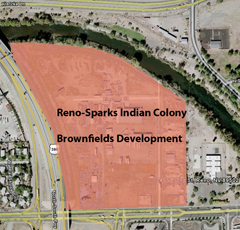Contact Pacific Southwest Waste Program
Pacific Southwest, Region 9
Serving: Arizona, California, Hawaii, Nevada, Pacific Islands, Tribal Nations
Nevada Tribal Community Transforms Contaminated Property
Shared Success
EPA, the Nevada Division of Environmental Protection (NDEP) and the Reno-Sparks Indian Colony (RSIC) joined efforts to clean up a former industrial site in Reno, Nevada. This is the first cleanup in Nevada to be completed using a Revolving Loan Fund (RLF) grant and the first of its kind on a tribal Brownfields site in the western region of EPA.
On August 21, 2008, NDEP and the City of Reno held an event to celebrate the cleanup of this property and the partnership between NDEP, EPA, and local partners. Among the attendees was Governor Jim Gibbons.
Additional Resources
Brownfields Grant to NDEP
In November 2007, RSIC was awarded a $950,000 Brownfields grant from EPA's Revolving Loan Fund to work on the site, located near Highway 395 on East Second Street. The site was previously home to several industrial operations including machine shops, a commercial printing shop, auto repair shops and a sheet metal fabrication factory. The site had a recorded release of diesel, propane, paint and paint thinner due to an explosion in April 1999 in an auto-painting facility.
Property Cleanup

In 2001, RSIC completed an eight year, multi-million dollar plan to purchase multiple properties comprising the 22-acre site. The properties were acquired with tribal tax revenues and a tribal municipal bond issue. Environmental site assessments uncovered the property’s former uses and indicated further investigation was needed. A second environmental site assessment was completed with assistance from NDEP, and found that soil was contaminated with pesticides, total petroleum hydrocarbons (TPH), metals, polychlorinated biphenyls (PCBs), lead, and nitrogen compounds from former industrial uses. RSIC used the Brownfields RLF grant to remove approximately 1,000 tons of contaminated soil, completing the first phase of cleanup. Since soil TPH levels were low on another parcel, areas of the property that would be redeveloped as the parking lot were not remediated. However, where soil would be disturbed for construction of the building, the contaminated soil was removed. Cleanup was completed in October 2007.
The New Development

The property will be redeveloped into Three Nations Plaza, future home of a Wal-Mart, which will generate jobs and up to $6 million in annual tax revenues. RSIC will use the tax revenues to repay bonds issued for the construction of a recently completed, $20 million tribal health center that provides services to over 9,000 Native Americans in the Washoe County area. Tax revenues will also be used to build and relocate to a new $8 million Northern Nevada Restitution Center for low-risk, nonviolent offenders on Indian Colony land. This will allow RSIC to develop additional commercial facilities near the New Three Nations Plaza at the location of the old restitution center. The new restitution center is expected to be completed in 2011. Tax revenues will also be used to enhance police services, fund education improvements in the Washoe County School District, and foster economic development.
RSIC is a federally recognized Indian Tribe composed of more than 900 members throughout its 2,000 acres of Tribal land in and within proximity to Reno, Nevada. The Colony seeks to both preserve its heritage and expand its economic development in an ever-demanding world. In order to meet this need, it has developed more than 80 acres in Reno and Washoe Counties that it now leases to a variety of commercial tenants.
